
PRIVATE COLLECTION
SUSANA CALÓ E GODOFREDO ENES PEREIRA | MISCHA TWITCHIN | SARA CARINHAS | SÓNIA CARVALHO | BEN RUSSELL
Integrated in an internacional film festival on archive, memory and ethnography, Family Film Project, this event aims to challenge artists and theorists to explore performativity from personal or other archival material or concept. As the intimacies and familiarities are problematized, creative possibilities are projected crossing disciplines and borders, reinforcing, within the event-festival, the fine line between the real life and ficcion.
For the this edition, Private Collection is dedicated to Foucault’s Thought. The intention is to create a set of performative proposals in its expanded values (interdisciplinary, spatial displacements, thematic displacements) able to dialogue with some central Foucault’s notions. Archive supposes the archivist, but as an “archaeologist” who does not look for general and abstract concepts but analyzes them in a game of appearance and displacement. The archive is not created by a subject of knowledge, but rather in the multiple webs between cultural, social, political, economic, subjective and historical practices. The archive also informs about this transformation, and the models that are adopted, once identified, add more meaning. Narrative and fiction intertwine because the plot is dense and resisting to the reading.
At the same time as performance has asserted its radical ephemerality, the demand for documenting and archiving its practices on behalf of performance research and historiography has grown. Private Collection will question, though, the performance’s relationship with the archive. The relationship could include the role of performance in the culture of the archive and the role of the archive in conceptualizations of performance; the future of performance and the archive in the digital age; the role of the document in performance research; the practices of performers’ archives.
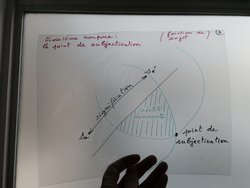
15 OCT | 17H00 | MUSEU NACIONAL SOARES DOS REIS | SALA DAS ESTÁTUAS | 50’
PARA ESCAPAR À NORMAPATIA:
ESQUIZOANÁLISE PARA TODOS
SUSANA CALÓ E GODOFREDO ENES PEREIRA
A film-maker is asked to film a psychiatric hospital. He decides to give the camera to the patients so that they can film their daily lives. A group of patients offer money to a person who dreams of becoming a cyclist. A cook who does therapy in the kitchen while preparing meals. A kitchen that is also an opera house. A crèche where the children are in charge. A driver who never got his driving licence. A weekly meeting where nothing is discussed. A salary system where everyone gets what they need. A laundry that is a meeting place. Two researchers investigating their own lives. Psychotherapy sessions by letter. A crystal wave. Jean Oury used to say that normopathy was our disease. Tosquelles said that after meeting normal people, he never had any difficulty understanding mad people. Storytelling machines to re-imagine politics. Only through desire can one read desire.
In this presentation, Susana Caló and Godofredo Enes Pereira explore a polyphony of documentary and archival material, video, images, oral histories and music, to present their research into the institutional unconscious and the idea of a 'militant analysis'.
BIOGRAFIAS
Susana Caló is a researcher in philosophy, psychopolitics and semiotics. She did her PhD at the Centre for Research in Contemporary Modern Philosophy in London, with a reconstruction of the politics of language and semiotics based on the work of the activist and psychoanalyst Félix Guattari. Her current research is dedicated to reconstructing minor histories of psychoanalysis and psychiatry in their intersections with broader political and social struggles, and the collective life of concepts in post-war French thought, through oral histories and archive building. She is a visiting researcher at the Centre for Humanities and Health, King's College London and co-investigator of the Pragmatic Genealogy of Concepts (KCL) project, funded by the British Academy. She is a member of the Other Ways to Care collective and co-founder of the Chaosmosemedia platform.
Godofredo Enes Pereira is an architect, researcher and director of the MA in Environmental Architecture at the Royal College of Art in London. He has a PhD from the Centre for Research Architecture at Goldsmiths University London. Over the last decade, he has been developing research, publications and exhibitions on environmental architecture, existential territories and collective equipment. He is a co-investigator on the Scales of Climate Justice project funded by the British Academy and founder of the GIT/Territorial Research Group.
Since 2017, Susana Caló and Godofredo Pereira have been working on the book CERFI. Militant Analysis, Collective Equipment and Institutional Programming, due to be published in 2024 by Minor Compositions.
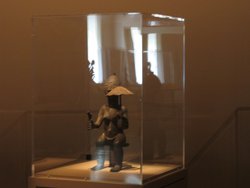
15 OCT | 18H00 | REITORIA DA UNIVERSIDADE DO PORTO / CASA COMUM | 30’
ON 'THE REFLEXIVITY OF
FORMS OF EXPERIENCE'
MISCHA TWITCHIN
In this year commemorating his death, how does Michel Foucault still speak to us? Besides the theoretical engagement of his enduring research – inviting us to think with and not simply about his work – there also is the legacy of his radio broadcasts, in which he quite literally speaks to us. This presentation will offer a dialogue with the absent presence of Foucault – with his evocation of the body in both the mirror image and the voice, exploring his essay on “the utopian body” (Le corps, lien d’utopies) and the discussion in his late seminars on “the structures of reflexivity”, as juxtaposed in a short film with photographs of African sculpture from an exhibition at the Musée du Quai Branly.
BIOGRAFIA
Dr Mischa Twitchin is a senior lecturer in the Theatre and Performance Dept., at Goldsmiths, University of London. He has contributed chapters to several collected volumes, as well as articles in journals such as Memory Studies, Contemporary Theatre Review, and Performance Research (an issue of which, On Animism, 24.6, he also co-edited). His book, The Theatre of Death – the Uncanny in Mimesis: Tadeusz Kantor, Aby Warburg and an Iconology of the Actor is published by Palgrave Macmillan; and his edited volume, Wittgenstein and Performance, by Rowman and Littlefield.
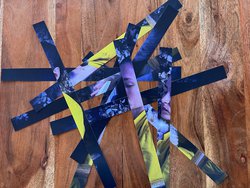
15 OCT | 18H30 | REITORIA DA UNIVERSIDADE DO PORTO / CASA COMUM | SALÃO NOBRE | 30’
BREVE ÚLTIMA MEMÓRIA
SARA CARINHAS
Designed in response to the challenge of the “Family Film Project,” this will be a performance-revisitation of the show “Última Memória” (premiered in 2023 and currently on tour), twisting its core into a brief encounter. A reading that is also a rehearsal. Once again, the doubts, once again the construction of another piece, almost as if the original show had never existed.
To shorten life or shorten the story is to frame it in a way that always leaves things out. Everything re-invented once again. Where does the tiniest matryoshka doll of us remain if we lose frames of our life? What construction remains of who we are? What image?
What figure is that, with nothing left to hold on to?
BIOGRAFIA
Lisbon, 1987. Performer, director, playwright, writer, acting coach, and teacher.
Sara Carinhas has worked in theater, film, television, and music with Adriano Luz, Alberto Seixas Santos, António Zambujo, Beatriz Batarda, Cristina Carvalhal, Clã, João Mário Grilo, Manoel de Oliveira, Manuel Mozos, Marco Martins, Margarida Cardoso, Nuno Cardoso, Nuno M. Cardoso, Ricardo Pais, Rita Redshoes, Tiago Guedes, and Valeria Sarmiento. She was awarded the L'Oreal Paris Young Talent Prize at the Estoril Film Festival for “Coisa Ruim” (2008). In 2015, she won the Golden Globe for Best Actress. On television, she appeared in series such as “3 Mulheres,” “Sara,” and “Doce,” and served as the acting coach for “Terapia” and was responsible for casting direction and acting coaching for “Snu,” both directed by Patrícia Sequeira. As a director, her notable works include "As Ondas" (2013), "Orlando" (2015), and "Limbo" (2019). Carinhas also wrote, directed, and performed in “Última Memória” (2023), which is currently on tour. She published her first book, “Imprudente Luto,” in 2023.
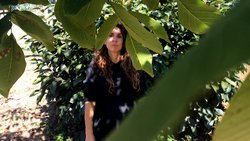
15 OCT | 19H00 | REITORIA DA UNIVERSIDADE DO PORTO / CASA COMUM | LABORATÓRIO FERREIRA DA SILVA | 30’
OBSERVAR OS SONS DA LUA E DA ÁGUA. E OS QUE VÊM DE DENTRO
SÓNIA CARVALHO
Washing anything is a timeless purification ritual. It is also a symbol for the cleaning and purification of the behavior of the psyche, as well as the cycles of life-death-life renewal.
In “Observar os sons da lua e da água. E os que vêm de dentro”, the performative gestures of a woman's body that washes and scrubs, guided by the archetype of Hestia, who personifies the “guardian of the house”, are subverted here: in frantic and powerful gestures performed sometimes with frictions of a body that sweeps the floor, now, with clothes that wash the back, the dress that gives back the moon's shine, the sleeve of a coat that rubs the thighs and pubis, and, the hair that strokes the hands.
The sounds, produced and amplified, looks like the howling of a wolf, the gnashing of teeth, the squeak of a door, along with the drumming of the adufe (portuguese percussion musical instrument) and the voice of the tradicional singer (cantadeira), lead to a ritualistic journey — to a world below the trees.
“Because, in Baba Yaga's territory there are things that fly at night, and that awaken again at the break of dawn, all of them summoned or invited by wild instinctive nature. There are the bones of the dead that still speak, and there are winds, destinies and suns, moon and sky, all living inside its huge chest.” (tradução propria)
Estés, Clarissa Pinkola, “Mulheres que correm com os Lobos: Mitos e Histórias do Arquétipo da Mulher Selvagem”, Editora Marcador, Barcarena, 2016, p. 120.
Performance by Sónia Carvalho, with the collaboration of Alberto Lopes, musician and sound designer, and the participation of the Cantadeiras from the Ethnography and Folklore Centre of the University of Porto.
BIOGRAFIA
Sónia Carvalho (1978, PT). Visual artist, teacher, researcher [ID+ (UA/DeCA] and CIEBA]. PhD in Fine Arts, specializing in Painting, from the Faculty of Fine Arts of the University of Lisbon, with a research grant from the Foundation for Science and Technology. Master in Drawing and Printing Techniques from the Faculty of Fine Arts of the University of Porto. Graduate in Fine Arts from the Higher School of Arts and Design of Caldas da Rainha of the Polytechnic Institute of Leiria. And she received a scholarship from the Erasmus program at the Faculty of Fine Arts at the Complutense University of Madrid.
Sónia Carvalho develops a transdisciplinary practice, from performance to video, from meditation to painting, centered on research into the representation(action) of the body and rite and the study of symbols and archetypes of the feminine spiritual universe, in the context of contemporary art and culture (namely, in the interaction between art and technology - for the creation of the image and moving images).
Artist represented by the contemporary art gallery Zet Gallery, UmbigoLab magazine and ANAMNESE. Award-winning artist, standing out with the acquisition prize at the XXII Bienal de Arte de Cerveira, 2022. Sónia has exhibited her work since 2002. Carvalho’s work belongs to several Portuguese collections, notably the Foundation PLMJ, the Biennial Foundation of Cerveira, and the EMERGE Cultural Association. With the artistic project Struggle Like A (Wo) Man # 1, 2019, she was selected under the creation stimulus program promoted by the Municipal Council of Torres Vedras, Portugal; in the same year she participated in the Cleaning The House workshop by artist Marina Abramovic, in Greece. In 2020, she participated in the first digital residency — the international artistic residency OCA (1st digital version) – Transmetatlanticus, Brazil / Portugal, produced by the EMERGE association in partnership with Casa Niemeyer – University of Brasília. She has participated in several international events as a speaker and as an artist.
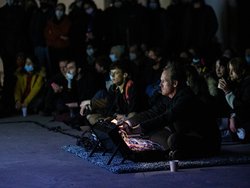
17 OUT | 21H15 | BATALHA CENTRO DE CINEMA - SALA 1 | 25’
CONJURING
BEN RUSSELL
A masterclass on the various natures of time: as subject, as feeling, as medium, as space. In a moving image practice that spans over two decades, the relative construct that we call time has formed the central inquiry for filmmaker / artist / performer Ben Russell’s work. From the animist jungle time of equatorial Suriname to the horizontal time of an anarchist collective in western France to the haptic experience of Being, temporality is a vehicle by which we can arrive at a transformative understanding of subject, self and audience as a simultaneity that is unique to cinema. Topically speaking, this masterclass can be viewed as a Venn Diagram in which activism, Einstein, ethnography, labor, noise music, and trance cinema are all equally represented.
BIOGRAFIA
Ben Russell (1976) is an American artist, filmmaker and curator whose work lies at the intersection of ethnography and psychedelia. His films and installations are in direct conversation with the history of the documentary image, providing a time-based inquiry into trance phenomena. Russell was an exhibiting artist at documenta 14 (2017) and his work has been presented at the Centre Georges Pompidou, the Museum of Modern Art, the Tate Modern, the Museum of Modern Art Chicago, the Venice Film Festival and the Berlinale, among others. He is a recipient of a Guggenheim Fellowship (2008), a FIPRESCI International Critics Prize (IFFR 2010, Gijón 2017), premiered his second and third feature films at the Locarno Film Festival (2013, 2017) and won the Encounters Grand Prize at the Berlinale Film Festival (2024). Curatorial projects include Magic Lantern (Providence, USA, 2005-2007), BEN RUSSELL (Chicago, USA, 2009-2011), Hallucinations (Athens, Greece, 2017) and Double Vision (Marseille, France 2024-). He is currently based in Marseille, France.